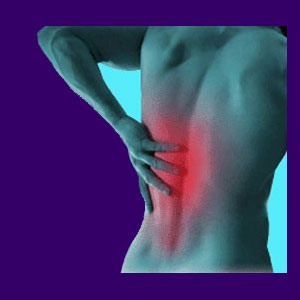
Sore back muscles are often described as tight, tense, achy, tired and hot. These symptoms might be located in particular areas of the back or might be widely distributed, depending on many factors. The main reasons why people experience a sore back include repetitively overusing these durable structures or simply pushing themselves to perform too much physical exertion, often without proper conditioning. The usual activity-related causes for muscular soreness include yard work, a sudden interest in exercise, sports activity, working around the house or starting a new job. If a patient has been sedentary for a long time prior to activity, or has tried to accomplish more than their body is capable of doing, then they have already set the ideal environment for back muscle pain to appear.
This essay takes a basic look at muscular soreness in the back, including the typical causes, symptoms and treatments for the condition.
Sore Back Muscles from Overuse and Injury
Sore back muscles can result from forcing the tissues to work beyond their ability to function properly. Back muscles are made for endurance and are extremely strong. However, they do have their limits and pushing past these points will cause small tears to appear in the muscle fibers. This is commonly referred to as back muscle strain. Although these small tears and pulls in the muscle fibers may take a few extra days to fully heal, they are not anything to worry about in the vast majority of affected patients.
Continued strenuous activity will also enact an accumulation of lactic acid, which is known to cause pain and soreness in muscle fibers. It will take the body some time to metabolize this waste product from the muscles, which is why soreness is generally resolved gradually over a period of 2 to 4 days.
Repetitive activity may cause RSI conditions to develop from recurrent small injuries to the exact same anatomical locations. Repetitive strain injury can become problematic and might lead to the development of scar tissue and the possibility for developing chronic pain. However, RSI remains a controversial topic within the medical system, since many doctors cite examples of purposeful repetitive strain being used to strengthen and develop muscles, rather than damage them.
Back Muscle Soreness from Nerve Innervation Concerns
All the back muscles are innervated by specific neurological roots within the spine. If one of these nerve roots becomes compressed, then symptoms may develop in the affected muscular group.
It is crucial to remember that enduring pain is not a typical symptom of a true pinched nerve. Instead, pain is usually transient and soon replaced by subjective, then objective numbness, followed by subsequent regional weakness. For partially compressed nerves, or nerves that suffer from a chemical radiculitis condition, chronic soreness may result in the back muscles, but these are uncommon events and not typical of most clinical presentations.
Sore Back Muscles from Ischemia
Psychologically-enacted back pain is known to affect the soft tissues of the body, including the muscles and nerves. Oxygen deprivation is the method of choice in creating these painful symptomatic expressions and ischemia can be a torturous disorder to endure. Worst of all is the fact that ischemic back pain is almost never recognized and diagnosed for what it truly is; a direct result of the mindbody interactions. Instead, it is usually misdiagnosed as coming from some coincidental spinal structural issue.
While low levels of chronic ischemia can cause soreness in large or small areas of the back muscle anatomy, most patients have symptoms that transcend a sore feeling and are better described as torturous.
In fact, for symptomatic ischemic syndromes, acute back pain is the usual short-term result, while intractable chronic pain is the long-term consequence. In essence, it is rare that minor soreness will be the only expression of a mindbody syndrome in the back muscles, but it is possible, especially when the causative psychoemotional issues are mild and not overly threatening.
Sore Muscles Guidance
Simple soreness, especially when the reason is known, is nothing to fear. The usual treatment recommendation says to just relax, take it easy a few days and use ice and heat to soothe the pain. Some topical back pain medications may be useful, as well, but patients should avoid oral pharmaceutical products, unless absolutely necessary.
If the patient has access to massage services, or is lucky enough to have a loved one with talented hands, they should take advantage of their opportunity, since massage is an excellent way to speed up the removal of lactic acid and rub away uncomfortable muscular tension.
If the muscle soreness continues, worsens or changes, consider making an appointment with a qualified physician. In most cases, a good doctor will recognize simple back muscle sprains and strains for what they are and tell the patient to stop worrying, go home and get some rest.





